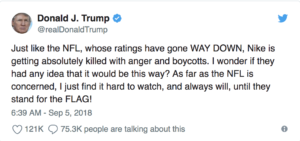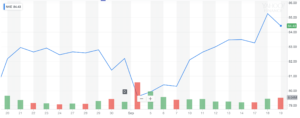A turbulent few years of American politics has created new groups of activists across the nation standing up for themselves, what they believe in and what they feel is right. The #MeToo movement disrupted Hollywood and has spread to Silicon Valley and to Washington. Black Lives Matter rallies have filled the streets of the United States. Celebrities and professional athletes have made statements of support on national TV. As we are living in a time of activism, people are encouraged to participate.
It is no longer acceptable to just stand by – for individuals, or for companies. This age of activism is translating to the way consumers behave. Support – or disapproval – of a company’s values is shown in purchase behavior. It may seem like a risky PR move for a company to stake a political or social stance, but recent events have demonstrated the possible pay-off.
On September 4th of this year, Nike released the following ad starring Colin Kaepernick:
Kaepernick was the part of a highly controversial protest starting in 2016. He and other NFL players began kneeling during the national anthem to protest racism, police brutality and social injustice. President Trump politicized the protests and many viewed it as disrespectful to those who have served our country. Nike took a huge risk with this ad, that would potentially alienate many of their previous customers.
Backlash seemed immediate after the ad was released. Social media sites flooded with videos of people burning their Nike products and criticizing the language of “sacrificing everything.” President Trump even partook in the conversation:
Although many – including fellow athletes LeBron James and Serena Williams – supported Nike’s decision to run this ad, the media primarily emphasized the negative reactions. This made Wall Street and Nike investors nervous. On the day the ad was released, there was a larger than normal sell-off of Nike stock.
However, as seen in the graph above, it was very insignificant in the scheme of things. In fact, since the ad was released Nike’s stock has seen reached an all-time high.
Instead of the #NikeBoycott approach, many people actually showed their support for the brand by going out and buying their products. According to the research firm Edison Trends, online sales jumped – sales rose 31% from Sunday (September 2nd) through Tuesday (September 4th). While that spike didn’t last long, it demonstrated the way consumers felt towards Nike and the divisive stance they took.
The support shown on social media, in sales and in pieces of journalism like, This Life: If Nike can stand with Kaepernick, I can shell out extra for sneakers, speak to the way retail activism works in this political climate. While the long-term stock and sale performances will likely not be heavily effected, the immediate reactions of consumers are telling. People will remember what Nike stands for when they go to buy their next pair of running shoes, and an individual’s own beliefs will impact whether they buy Nike or a competing brand.



Leave a Reply
You must be logged in to post a comment.